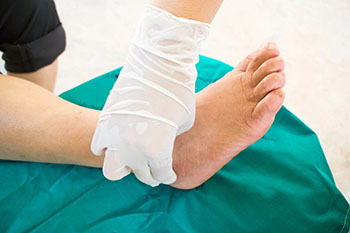Connect With Us
Skin Cancers of the Feet

What Are Skin Cancers of the Feet?
Skin cancer can develop anywhere on the body, including in the lower extremities. Skin cancers of the feet have several features in common. Most are painless, and often there is a history of recurrent cracking, bleeding, or ulceration. Frequently, individuals discover their skin cancer after unrelated ailments near the affected site.
Causes
We often view the sun's harmful rays as the primary cause of skin cancer; the condition is often found on parts of the body that receive the most sun exposure. Skin cancers of the feet, however, are more often related to viruses, exposure to chemicals, chronic inflammation or irritation, or inherited traits. Unfortunately, the skin of the feet is often overlooked during routine medical examinations, and for this reason, it important that the feet are checked regularly for abnormalities that might indicate evolving skin cancer.
Causes
Psoriasis is an autoimmune disease and seems to run in families. Psoriasis tends to be more severe in people with weakened immune systems, including those with AIDS and those undergoing treatment for cancer. Stress also seems to make psoriasis worse.
Symptoms
People with psoriasis typically have areas of thick, reddened skin with dry, whitish-silver patches. The dry patches are called psoriatic plaques. The skin may feel itchy.
Psoriasis is most commonly found on the elbows, knees, and bottoms of the feet. It can also affect the fingernails, toenails, and joints of the body.
Home Care
Keep the skin well-moisturized to maintain skin health and ease the discomfort of psoriasis. Oatmeal baths can soothe the skin. Hypoallergenic moisturizer, applied on a regular basis, also helps.
Phototherapy, or light therapy—which involves exposing the skin to UV-B light—may be helpful as well. Some people use UV-B lights at home under a doctor's direction. Other patients carefully time their exposure to sunlight. Talk to your doctor to see if phototherapy may be helpful for you.
When to Visit a Podiatrist
If you have psoriasis on your feet, see a podiatrist. A podiatrist can also help determine the cause of reddened, itchy feet. (Psoriasis can mimic severe athlete's foot or contact dermatitis.) If you have red, irritated feet that haven't responded to home or medical treatment, see a podiatrist.
Diagnosis and Treatment
A podiatrist will carefully examine your feet and take a thorough medical history. He or she may also take a tiny sample (biopsy) of the affected area to confirm a diagnosis of psoriasis.
Treatment depends on the severity of the disease. Mild cases of psoriasis can be treated with topical steroid creams, applied directly to the area. More severe cases of psoriasis may need systemic (whole body) treatment. Drugs that depress the immune system, including methotrexate and cyclosporine, help some people with psoriasis. Certain biologic drugs, including Humera® and Enbrel®, are also useful for psoriasis. If you have severe psoriasis, you may work with a variety of medical specialists to get your psoriasis under control.
Prevention
You can't prevent the development of psoriasis, but you can avoid things that make your psoriasis worse. Stress management techniques may help some people with psoriasis. Alcohol, dry air, and too much or too little sunlight seems to trigger psoriasis for some people, so controlling your exposure to things that irritate your psoriasis may help. Talk to your doctor to find out what you can do to control your psoriasis at home.
